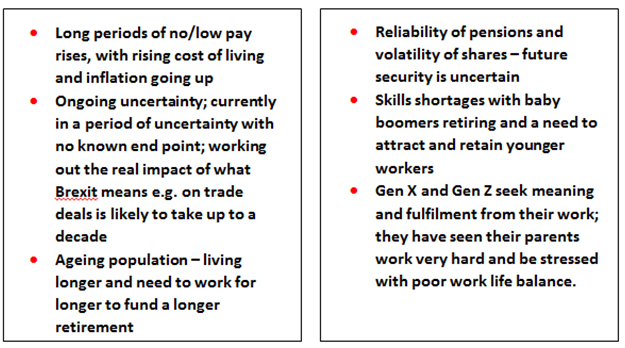This article by Rachel Brushfield, Talent Liberator at Energise explores the vital topic of fulfillment at work and how the changing expectations of workers towards meaning and purpose and away from career status and money are starting to make companies rethink their long established ways of working. This article explores how individuals can achieve fulfillment at work and how companies can provide it through their policies.
What is fulfillment?
The dictionary definition of fulfillment is paradoxical. Fulfillment means both a ‘want’: “The achievement of something desired, promised, or predicted” and also a ‘must’’: “The meeting of a requirement, condition, or need” or "The fulfillment of statutory requirements."
An average person spends more than 100,000 hours in their lifetime working. A lack of fulfillment and long hours can feel like a repetitive treadmill with life feeling empty and stressed. With life expectancy increasing and many people having to retire later and work longer due to pension uncertainty and the need to fund an extended life, the importance of fulfillment at work is in the spotlight. If we are all going to be working for longer, we might as well enjoy it.
What creates career satisfaction and fulfillment?
Bruce Woodcock from the University of Kent has explored what creates career satisfaction and has identified 15 factors:
How many employers, whatever their size, have designed their roles, structures and career and professional development around these factors? How would you rate your organisation against each of these 15 factors out of 100%?
Our own Energise research indicates that to increase fulfillment for workers, they seek; new stimulating challenges, to only do work that they enjoy, to gain increased autonomy and to learn new skills.
The things from our research that would most increase meaning, purpose and fulfillment from work are:
- Learning new career enhancing skills
- Creating a varied and stimulating portfolio career
- A role/employer better aligned with their personal values and motivations
- Joining an organisation or working for clients that make a difference to the world
- Changing to a more fulfilling second career
Why is fulfillment at work becoming more important?
The reasons for a growing desire for fulfillment and meaning as work motivations, compared with power, status and money include:
Click here for further examples
What are the benefits to business/employers of increasing fulfillment?
- Link between fulfillment and productivity and performance - how people feel affects what they do, or don't do
- When people feel fulfilled by their work, they give more of themselves
- Achieve more from less
- Positive work of mouth with recruitment freezes and the focus on lean working, to attract new employees to the business saving recruitment fees
- Employees can easily do a 'silent protest vote', caused by a lack of fulfillment; look busy but achieve little of significance to the business, especially if their line managers are stretched and lack time to actively manage them
How can employers provide more fulfillment through working practices and policies?
Many organisations are rethinking traditional working policies and processes to adapt to Generation Y and Z. Here are some ideas for your organisation.
Click here for further examples
How can employees positively influence their own career fulfillment?
Individuals need to take responsibility for their own career fulfillment. Ways include:
Click here for further examples
Self-reflective questions
- How can I increase my own career fulfillment?
- How can I improve the career fulfillment of my direct reports?
- What most motivates me at work?
- What most demotivates me at work?
- How can I best learn from good practices at other organisations?
- What have been my most fulfilling career highlights to date and how can I replicate them?
- What or who is most causing dissatisfaction at work?
- How could my organisation positively influence the psychological contract to give talent more meaning and autonomy?
- How clear am I about what our employees really think and feel and their intentions to stay or leave?
- What is the number 1 factor causing disengagement in my organisation and how can we engage the disengaged employees themselves in overcoming it?
Summary and Conclusions
Longer working lives combined with the different needs and wants of younger employees mean that career fulfillment is moving higher up the management agenda. With Generation Y becoming a growing number of management decision makers, working practices are set to look very different in the future to how they have been in the past. Employers who put fulfillment and meaning at the heart of their decision making will attract and retain the cream of talent, creating a human capital competitive advantage.
By Rachel Brushfield. Rachel is a Talent Liberator and runs Energise - the Talent Liberation Company which was established in 1997. She is a career fulfillment coach and career and talent and learning and development strategist, specialising in portfolio careers. Rachel is a published author in Talent management, Professional Development, Work-life balance and Gender balance.




